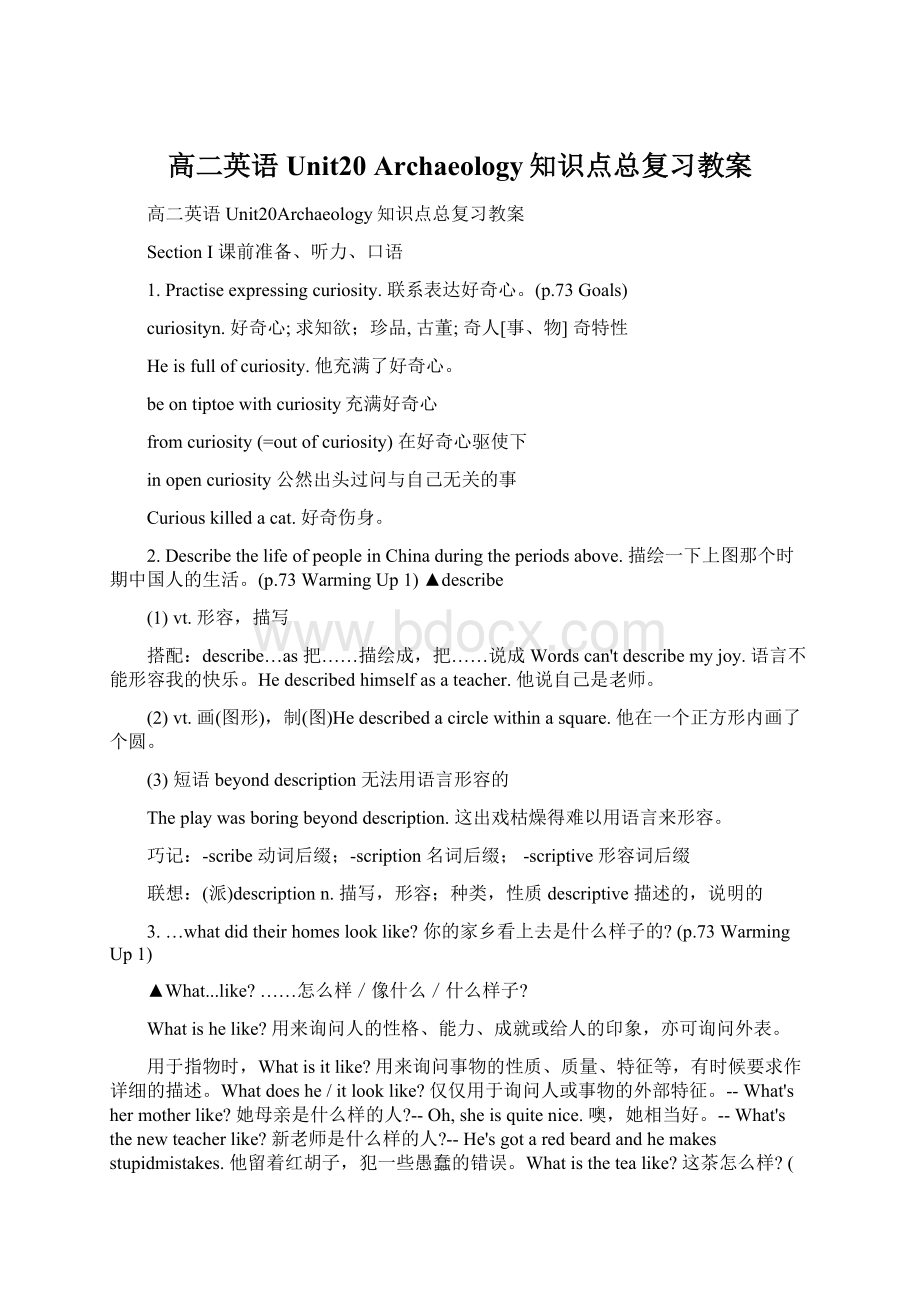高二英语Unit20 Archaeology知识点总复习教案文档格式.docx
《高二英语Unit20 Archaeology知识点总复习教案文档格式.docx》由会员分享,可在线阅读,更多相关《高二英语Unit20 Archaeology知识点总复习教案文档格式.docx(13页珍藏版)》请在冰豆网上搜索。

-scribe动词后缀;
-scription名词后缀;
-scriptive形容词后缀
联想:
(派)descriptionn.描写,形容;
种类,性质descriptive描述的,说明的
3.…whatdidtheirhomeslooklike?
你的家乡看上去是什么样子的?
(p.73WarmingUp1)
▲What...like?
……怎么样/像什么/什么样子?
Whatishelike?
用来询问人的性格、能力、成就或给人的印象,亦可询问外表。
用于指物时,Whatisitlike?
用来询问事物的性质、质量、特征等,有时候要求作详细的描述。
Whatdoeshe/itlooklike?
仅仅用于询问人或事物的外部特征。
--What'
shermotherlike?
她母亲是什么样的人?
--Oh,sheisquitenice.噢,她相当好。
sthenewteacherlike?
新老师是什么样的人?
--He'
sgotaredbeardandhemakesstupidmistakes.他留着红胡子,犯一些愚蠢的错误。
Whatisthetealike?
这茶怎么样?
(指质量)--Whatwastheconcertlike?
音乐会怎么样?
--Itwasexcellent.太妙了。
What'
stheweatherlikethismorning?
今天上午的天气怎么样?
--Whatdoesitlooklike?
它是什么样子?
--It'
ssmallandsquare.它很小,是正方形的。
--Whatdoeshelooklike?
他是什么样的人?
--Heistallandthinandverybadlydressed.他又高又瘦,穿戴很糟。
注意:
Whatishe?
用来询问职业、职务、社会地位等。
Howishe?
/Howareyou?
通常对身体状况的询问。
--Whatisyourbrother?
你哥哥是做什么工作的?
--Heisaworker.他是个工人。
--Howareyou?
你好吗?
--Fine,thankyou.Andyou?
很好,你呢?
4.I’mcuriousabout…我对…感到好奇。
(p.75Usefulexpressions)
▲curiousadj.好奇的;
有求知欲的Agoodstudentshouldalwaysbecurioustolearn.好学生应有求知欲。
Don'
tbetoocuriousaboutthingsyouarenotsupposedtoknow.对于不要你知道的事别多去打听。
Itiscuriousthatheshouldhavefailedtowintherace.他竟然没赢得比赛,真是奇怪。
becuriousabout对……好奇;
Itiscurious+that...……是奇怪的;
becurioustodosth.渴望去做某事(强调好奇心态)
辨析:
curious,anxious与eager
curious强调好奇心态,anxious侧重“忧虑”,
eager作“渴望的,热切的”强调一种积极向上的心态。
Theboyiscuriousabouttheoriginofmankind.这个男孩对人类起源感到好奇。
Weareanxiousabouthissafety.我们为他的安全而忧虑。
HeiseagertojointhePLA.他渴望参加人民解放军。
(派)curiouslyadv.好奇地curiosityn.好奇(心)
SectionII阅读
5.OnMay3,2002,archaeologistsinEnglandfoundagraveofamandatingbacktoaround2300BC.20XX年5月3日,英国考古学家发现了一座约公元前2300的男人墓穴。
(p.75Reading第一段第1行)
datebackto追溯到……
▲date此处作动词用,意为“确定……的年代”“计算……的日期”通常与from或backto连用,意为“追溯到……”如:
①Thecastledatesbacktothe14thcentury.这城堡可以追溯到十四世纪。
②Theprosperityofthefamilydatesfromthewar.这个家族的富裕可追溯到战争年代。
③ThiscustomdatesbacktotheTangDynasty.这习俗可追溯到唐朝。
【注】date作动词时,可引申为“(开始)变得过时”之意。
如:
①SomeJamesBondfilmshavedatedmorequick-lythanothers.有些"
007"
电影比其他的过时得快。
②Thissortofstyleneverdates.这种流行式样永远不会过时。
【注】date还有“显示人的年龄”之意。
Thatsuitdatesyousomuch.你穿那套衣服使你显得很老。
6.Thatwouldhavemadehimamanofdistinction.这能显示出他地位的卓越。
(p.75Reading第二段第3行)
distinctionn.区别;
差别;
不同之处;
特征;
特性;
个性;
优越;
卓越;
盛名;
功勋;
荣誉;
勋章
thechiefdistinctionofChinesefood中国食品的主要特征
awriterofdistinction一位卓越的作家
academicdistinctions学术上的荣誉
Thereisnoappreciabledistinctionbetweenthetwins.在这对孪生子之间看不出有什么明显的差别。
Hisdistinc-tionofsoundisexcellent.他辨别声音的能力很强。
Hisstylelacksdistinction.他的文体缺乏个性。
7.Nexttothemlayacushionstone,uponwhichthemancouldworkmetal.在它们的旁边放着一块垫东西的石头,这个人有可能在上面锻造金属。
(p.75Reading第三段第2-3行)
▲本句是一个倒装句,主语是acushionstone,谓语是lie的过去式lay,整个谓语都提前,为全部倒装。
这种倒装结构主要是为了句子的平衡,在宾语中,有时句子的主语过长,又没有宾语,为了使句子较为平衡,同时也为了使句子更生动,常将状语提到句首,将主谓倒装,这种倒装是直接把谓语动词放到主语之前,不需要加助动词。
请阅读下面的倒装句,体会这种倒装句的结构。
①Overthewallcameashowerofstones.从墙上飞来一阵石块。
②Onevery-sidestretchedfieldsofgreenwheat.四周都是葱茏的麦田。
③Atthetopofthehillstoodatinytemples.在山顶上有一座小小的寺庙。
④Nexttoitstoodapileofpapercups.它旁边立着一堆纸杯。
⑤Inthedistancecouldbeseenthegreenhills.能看到远处绿色的群山。
⑥Inthedoorwaystoodamanwithagun.门道里站着一个拿枪的人。
▲work在此处作及物动词用,意为“制作”“锻造”“塑造”。
①Heworkedasilverdollarintoabracelet.
他把一枚银元铸成一只手镯。
②Theyworkedapieceofcopperintoatray.他们把一块铜铸成一个盘子。
【注】work作及物动词时有多种意思,请阅读下列句子,体会work的含意。
①Heworkedhisfarmwithsuccess.他成功地经营着他的农场。
②Ourteacherworksusveryhard.我们的老师对我们抓得很紧。
③Thewoundedmanworkedhiswayacrossthefieldsonhishandsandknees.这受伤的人靠手和膝盖爬过田野。
④Canyouworkthestoneintoplace?
你能慢慢挪动石头使它就位吗?
⑤Thelandlordalmostworkedhisfarmhandstodeath.那地主迫使雇农们累死累活地干。
⑥Doyouknowhowtoworkthemachine?
你知道这机器怎么开吗?
8.Itwasallthatapersonwouldneedtosurvive–clothing,tools,weapons,potteryandsparematerialstomakenewtools.这些全都是一个人赖以生存的必需品-衣服、工具、武器、陶瓷、以及制造新工具用的备用材料。
(p.75Reading第三段倒数第1行)▲spare
(1)adj.备用的Pleasestaywithus,wehaveaspareroomforyou.请住下吧,我们有给你的备用房间。
Eachcarshouldhaveasparetyre.每辆车都应有个备用轮胎。
(2)adj.多余的,空闲的Whatdoyoulikedoinginyoursparetime.在空余时间,你喜欢干什么?
Haveyougotasparemoment?
ThereissomethingI'
dliketodiscuss.你有空吧?
我有事要跟你讨论。
(3)v.出让,抽出(时间)让给Hesaidhecouldspareme5minutes.他说他能为我抽出5分钟的自由活动时间。
Canyousparemethisbookforawhile?
这本书你能让我看一会儿吗?
(4)v.节约,省用Wehopethatreaderswillnotsparetheircomments.我们希望读者无保留地提出意见。
Notroublewassparedtomakesuretheguestsenjoyedthemselves.不惜一切代价确保客人们玩得尽兴。
(5)v.省掉,用不着Wecanspareyoufortomorrow.明天我们可以不要你帮忙了。
Usethetelephoneandspareyourselfavisit.打个电话,用不着你亲自去一趟。
sparenoeffort(s)不遗余力;
sparenoexpense不惜工本
9.Thediscoveryisimportantforavarietyofreason.这次发现非常重要,其原因是多方面的。
(p.75Reading第四段第1行)▲variety
(1)n.多样化,变化Shedoesn’tliketheworkbecauseitlackedvariety;
shewasdoingthesamethingallthetime.她不喜欢这项工作因为它缺乏变化,她过去一直做同样的工作。
(2)n.种类Everyonearrivedlateattheparty,foravarie-tyofreasons.由于种种原因,所有人到会都迟到了。
拓展:
avarietyof=varietiesof各种各样alotof=lotsof大量,许多amassof=massesof众多,大量都既修饰可数名词也修饰不可数名词
(派)varyv.变化;
改变variousadj.不同的,各种各样的
10.Archaeologiststendtobelievethatthismanwasamemberofapowerfulclass…考古学家倾向于认为这个人是有权阶级中的一员。
(p.76Reading第一段第1行)▲动词tend的用法
(1)tend在本课中作“倾向于”“有某种趋势”解,后接不定式。
①Mymothertendstogettiredintheevenings.我母亲在晚上容易疲劳。
②Hisnovelstendtobepessimistic.他的小说有悲观倾向。
③Aproblemformanufacturersisthatlightercarstendtobenoisy.制造商所面临的问题是较轻型的轿车往往噪音很大。
④Ittendstorainalotinsummerhere.这儿夏天常常下雨。
⑤Itendtothinkthatmembersofparliamentdoagoodjob.我常常以为议员们的工作总是做得很好。
(2)tend也可作“有助于”解。
Thesemeasurestendtoimproveworkingconditions.这些措施有助于改善工作条件。
(3)tend在正式用语中有“照管”“照例”“护理”之意,相当于lookafter。
①Hetendstheflowerbedsandevergreensthathehasplantedinthedriveway.他总是细心呵护着种植在车道边的花圃和常青树。
②Shetendedherhusbandcarefullyduringhisillness.丈夫生病期间,她悉心照顾他。
11.Butthesmallerbluestones,stillweighingfourtonsonaverage,camefromwestWales.但是,更小的蓝石头平均都有四吨重,它们是从威尔士西部运来的。
(p.76Reading第二段第3行)▲weigh
(1)vt./vi.称……的重量,掂量……的分量;
重量为Haveyouweighedyourselflately?
最近你称体重了吗?
Thefirstman-madesatelliteofourcountryweighs173kilograms.我国第一颗人造卫星重173公斤。
weigh作及物动词,意为“称……”,强调动作;
用作不及物动词,意为“重……”,没有被动语态。
(2)v.考虑,权衡Youhavetoweighthecostsofthenewsystemagainstthebenefititwillbring.你必须权衡新体系的花费和它将带来的利益。
weightheadvantagesanddisadvantages权衡利弊
byweight按重量计算;
putonweight体重增加;
loseweight体重减轻;
weightlifting举重
Theyaresoldbyweight.它们是按重量出售的。
She'
slostweight/putonweightsinceIlastsawher.从我上次见到她,她已经变瘦/胖了。
12.Itisnotyetknownhowthesewereconveyedoveradistanceof380kilometres.至今还不知道这些石头是如何从380公里以外的地方运来的。
(p.76Reading第二段第4行)▲谈谈动词convey的用法
(1)本课中convey作“搬运”“运送”解。
①ThisshipconveysoilfromtheMiddleEast.这艘船从中东运输石油。
②Thistrainconveysbothpassengersandgoods.这列火车既载客又运货。
③Ataxiconveyedustotherailwaystation.一辆出租车将我们载到火车站。
④Achimneyconveyssmoketotheoutside.烟囱将烟排到室外。
(2)convey可作“表达”“传达(思想感情)”“转达”解释。
①"
Really?
"
Isaid,tryingtoconveythatitdidnotreallymatter.“真的吗?
”我说,意思是说那并非真的要紧。
②Conveymycongratulationstoyourbrother.代我向你弟弟表示祝贺。
③Hismannerconveyedaslightnervousness.他的态度透露出一点紧张。
④Icouldn'
tconveymyfeelingsinwordsatthattime.当时我的心情无法用语言表达。
⑤WordscannotconveyhowhappyIam.言语无法表达我是多么幸福。
(3)convey亦可作“传导”“传播”“传染”解。
①Airisthemediumbywhichsoundwavesareconveyed.空气是声波传播的媒质。
②Awireconveysanelectriccurrent.导线输送电流。
13.ItispossiblethattheKingofStonehengewaslinkedtothestones:
…这可能与巨石王有关…(p.76Reading第二段倒数第2行)▲link
(1)v.用环连接;
连接,联系Theroadlinksallthenewtowns.这条路联通所有新城镇。
Ourstruggleagainstimperialismiscloselylinkedtothatoftheworld'
speople.我们的反帝斗争是同全世界人民的反帝斗争紧密联系的。
(2)n.环节,链环Researchhasestablishedalinkbetweensmokingandlungcancer.研究已确定了吸烟与肺癌的关系。
Thelinksinachainofdevelopment.发展过程中的各个环节Culturallinks文化联系Keepcloselinkswiththemasses密切联系群众
link(up)with,connectwith及join(…to)与adjointolink(up)with=connectwith与……相连接:
通常“水域”相连用link(up)with,“车辆(道路,交通)”相连用connectwithjoin(…to)指直接连接(两个以上的东西)adjointo与……毗邻Theretheirrigationcanallinksupwiththereservoir.这条灌溉渠道在那儿与水库连接起来。
Thetrolleybusconnectsherewithabusfortheairfield.这辆无轨电车在这儿衔接去机场的公共汽车。
Thenewhighwayhasjoinedourcommunetothecity.这条新高速公路把我们的公社与城市连接起来了。
Thecottonfieldadjoinstothericefield.棉田与稻田相接。
14.…hemayhavehadahandinplanningthemonu-ment,orinhelpingtransportandpullupthestones.他可能参与策划建立这个纪念碑,或者帮助运输和竖起巨石。
(p.76Reading第二段倒数第1-2行)
▲havea/one'
shandin
(1)也可以用takeahandin,意为“参与”“介入”“对…负责一部分责任”。
①Ihadnohandinarrangingthemeeting.我不负责安排这次会议。
②IdoubtJohnhadahandinthis.我怀疑约翰参与此事。
③ThismatterisinMrWilson'
scharge.Ican'
thaveahandinit.这件事由威尔逊先生负责,我不能插手。
④Tomhassomedifficultyinrepairinghisradio.Let'
stakeahand